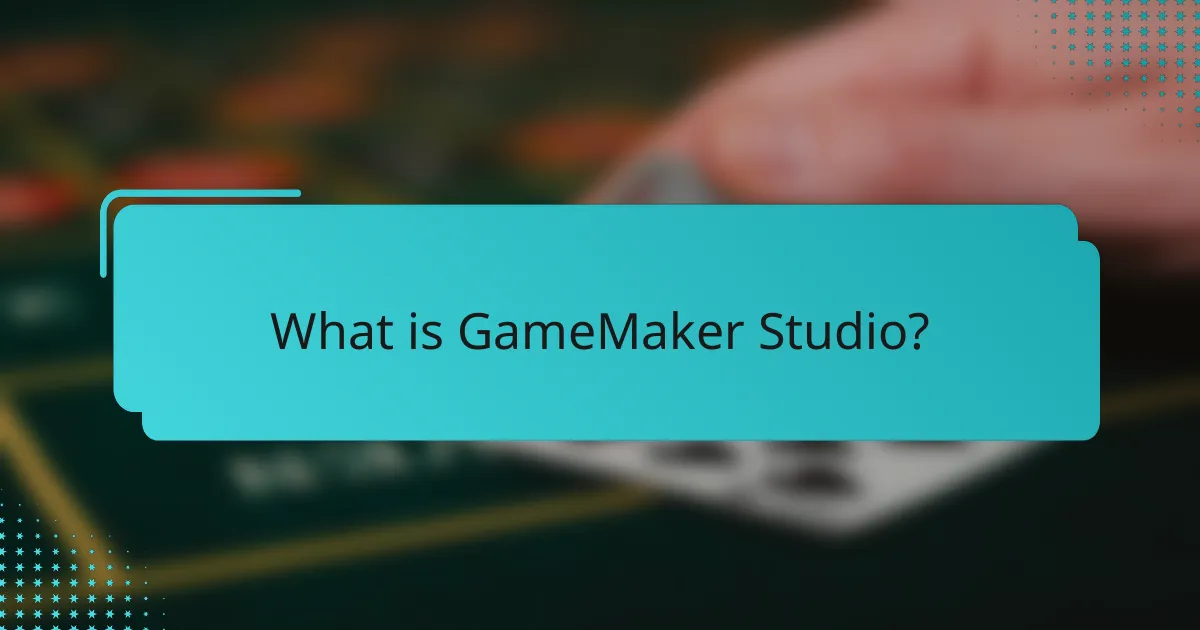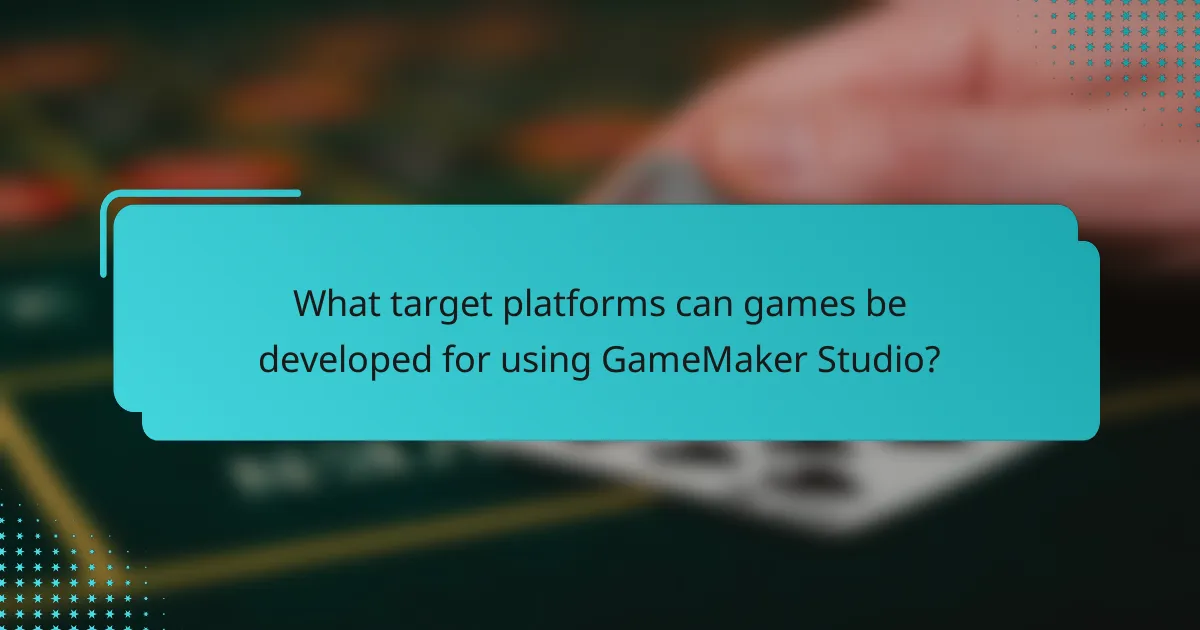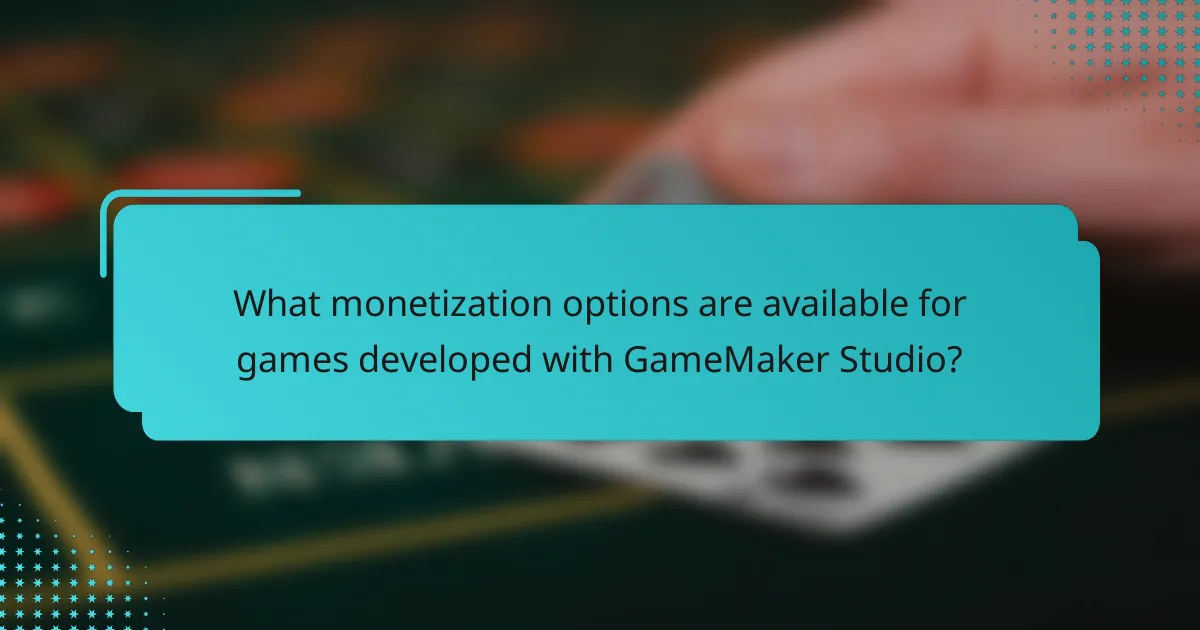
What is GameMaker Studio?
GameMaker Studio is a game development platform designed for creating 2D games. It provides a user-friendly interface and a drag-and-drop functionality for beginners. Developers can also use its proprietary scripting language, GML, for advanced programming. GameMaker Studio supports multiple target platforms, including Windows, macOS, Android, iOS, and HTML5. The software has been widely adopted in the indie game development community. Notable games created with GameMaker Studio include “Undertale” and “Hyper Light Drifter.” This versatility makes it a popular choice for both novice and experienced developers.
How does GameMaker Studio enable game development?
GameMaker Studio enables game development through its user-friendly interface and powerful features. It provides a drag-and-drop system that simplifies the game creation process. This allows beginners to create games without extensive programming knowledge. Additionally, GameMaker Studio supports its own scripting language, GML, for more advanced users. This combination of tools caters to both novices and experienced developers. The platform also offers cross-platform capabilities, enabling games to be published on various devices. GameMaker Studio has a large community and extensive documentation, which aids developers in troubleshooting and learning. These aspects collectively enhance the game development experience.
What are the primary features of GameMaker Studio?
GameMaker Studio offers a range of primary features that enhance game development. It includes a user-friendly drag-and-drop interface for easy game design. The platform supports multiple programming languages, including its own GameMaker Language (GML). GameMaker Studio allows for cross-platform deployment to various devices, such as Windows, macOS, iOS, and Android. It provides a robust sprite and animation editor for creating visual assets. The integrated physics engine facilitates realistic game mechanics. Additionally, GameMaker Studio features built-in tools for debugging and performance optimization. These features collectively make it a versatile tool for both beginners and experienced developers.
How does the interface of GameMaker Studio support users?
The interface of GameMaker Studio supports users by providing an intuitive and user-friendly design. It features a drag-and-drop functionality that simplifies the game development process. This allows beginners to create games without extensive programming knowledge. The interface includes a resource management system that organizes assets efficiently. Users can easily access tools and features through a streamlined menu layout. Additionally, the built-in code editor supports syntax highlighting and auto-completion. This enhances the coding experience for more advanced users. Overall, the interface caters to both novice and experienced developers, making game creation accessible to a wider audience.
What makes GameMaker Studio easy to use?
GameMaker Studio is easy to use due to its user-friendly interface and drag-and-drop functionality. This design allows users to create games without extensive programming knowledge. The built-in tutorials and documentation guide beginners through the development process. Additionally, GameMaker Studio supports a scripting language called GML, which is accessible for those who wish to code. The platform also offers a wide range of pre-built assets and templates. These features streamline game development and reduce the learning curve. GameMaker Studio’s community provides further support through forums and shared resources. Overall, these elements contribute to its reputation as an approachable game development tool.
How does the drag-and-drop functionality work in GameMaker Studio?
Drag-and-drop functionality in GameMaker Studio allows users to create game logic visually. Users can select actions and events from a palette and place them into a workspace. This method simplifies programming by eliminating the need for code writing. Each action can be customized through properties in the workspace. The visual layout helps users see the flow of game logic clearly. This feature is particularly beneficial for beginners and non-programmers. It enhances productivity by making game development more intuitive. GameMaker Studio’s drag-and-drop system supports rapid prototyping and iteration.
What programming languages can be used with GameMaker Studio?
GameMaker Studio primarily uses GameMaker Language (GML) for scripting. GML is specifically designed for game development within the platform. Additionally, GameMaker Studio supports C++ for native extensions. This allows developers to create high-performance modules. GML is a versatile language that simplifies game logic and event handling. It is widely used due to its ease of learning. The integration of C++ enhances functionality for advanced users. These languages cater to both beginners and experienced developers.
What are the learning resources available for GameMaker Studio?
GameMaker Studio offers various learning resources for users. The official website provides comprehensive documentation and tutorials. Users can access video tutorials on platforms like YouTube. Community forums are available for peer support and advice. Additionally, there are online courses on platforms like Udemy and Coursera. Books are also published that focus on GameMaker Studio development. These resources cater to beginners and advanced users alike.
How can beginners get started with GameMaker Studio?
Beginners can get started with GameMaker Studio by downloading the software from the official website. After installation, they should explore the built-in tutorials and documentation. These resources provide step-by-step guidance on using the interface and features. Beginners can also access community forums for additional support and tips. Creating a simple project helps in understanding the workflow. GameMaker Studio offers drag-and-drop functionality, making it user-friendly for novices. Additionally, beginners can experiment with the GameMaker Language (GML) for more advanced programming. Engaging with online courses can further enhance their skills in game development.
What community support exists for GameMaker Studio users?
GameMaker Studio users benefit from a variety of community support options. Official forums provide a platform for users to ask questions and share experiences. Social media groups, especially on Facebook and Reddit, facilitate discussions and resource sharing. YouTube channels offer tutorials and guides for different skill levels. Additionally, Discord servers create real-time communication opportunities among developers. Community events, such as game jams, foster collaboration and learning. The GameMaker Marketplace allows users to share and purchase assets, enhancing project development. These resources collectively support users in problem-solving and skill enhancement.

What target platforms can games be developed for using GameMaker Studio?
Games developed using GameMaker Studio can target multiple platforms. These platforms include Windows, macOS, Linux, Android, iOS, and HTML5. GameMaker Studio also supports console platforms such as PlayStation and Xbox. Each platform allows developers to reach different audiences. The versatility of GameMaker Studio enhances its appeal for game developers. This capability is backed by the software’s built-in export options for various operating systems and devices.
Which platforms are supported by GameMaker Studio?
GameMaker Studio supports multiple platforms for game development. These platforms include Windows, macOS, and Linux for desktop applications. For mobile applications, GameMaker Studio supports iOS and Android. Additionally, it allows publishing to web platforms such as HTML5. Console platforms like PlayStation and Xbox are also supported, but they require specific licenses and additional steps. This extensive range of platforms enables developers to reach a wide audience with their games.
How does GameMaker Studio facilitate cross-platform development?
GameMaker Studio facilitates cross-platform development by providing a unified development environment. It allows developers to create games that can be exported to multiple platforms, including Windows, macOS, Android, iOS, and HTML5. The platform uses a drag-and-drop interface alongside its scripting language, GML, which simplifies coding for various devices.
GameMaker Studio includes built-in tools for optimizing games for different screen sizes and resolutions. It also offers platform-specific features and APIs, ensuring that games can utilize the unique capabilities of each target platform. Additionally, the software streamlines the publishing process, allowing developers to manage their game builds and updates efficiently across multiple platforms.
These features collectively enable developers to reach a wider audience without needing to rewrite code for each platform.
What are the specific requirements for publishing on each platform?
GameMaker Studio has specific requirements for publishing on various platforms. For Windows, users need a compatible version of Windows and the GameMaker Studio license. For macOS, a Mac computer and an Apple Developer account are necessary. Publishing on iOS requires a Mac, Xcode, and an Apple Developer account. Android publishing needs the Android SDK and a Google Play Developer account. For HTML5, a web server is required for hosting. Each platform has unique compliance and submission guidelines that must be followed.
What are the advantages of targeting multiple platforms with GameMaker Studio?
Targeting multiple platforms with GameMaker Studio allows developers to reach a wider audience. This increases potential sales and user engagement. GameMaker Studio supports various platforms like Windows, macOS, iOS, Android, and HTML5. This versatility enables developers to create games for both desktop and mobile users.
Additionally, targeting multiple platforms can enhance the game’s visibility in different markets. Developers can leverage unique features of each platform for optimized gameplay. Cross-platform capabilities reduce the need for separate codebases, saving time and resources.
According to YoYo Games, the company behind GameMaker Studio, this multi-platform support is a key feature that attracts developers. It simplifies the development process while maximizing market reach.
How does platform targeting affect game design choices?
Platform targeting significantly influences game design choices. Different platforms have unique hardware capabilities and user expectations. For example, mobile platforms require touch controls and shorter gameplay sessions. In contrast, console games can utilize more complex controls and longer playtimes.
Additionally, graphics and performance optimization vary by platform. A game designed for high-end PCs can feature advanced graphics not feasible on mobile devices.
GameMaker Studio offers specific tools for targeting various platforms. Developers must consider resolution, aspect ratios, and input methods when designing. These factors dictate user experience and gameplay mechanics.
Research indicates that platform-specific design enhances player engagement. A study by the International Journal of Game Design emphasizes that tailored experiences lead to higher user satisfaction.
What are the potential revenue implications of multi-platform releases?
Multi-platform releases can significantly enhance revenue potential for game developers. They allow access to a broader audience across various devices. This increased reach often leads to higher sales figures. According to a report by Newzoo, games on multiple platforms can generate up to 50% more revenue than single-platform titles. Multi-platform releases also enable developers to capitalize on different monetization strategies, such as in-app purchases and subscriptions. Furthermore, cross-platform play can increase player engagement, leading to longer retention rates. Overall, multi-platform releases create diverse revenue streams and improve financial performance.

What monetization options are available for games developed with GameMaker Studio?
Games developed with GameMaker Studio can utilize several monetization options. These include in-app purchases, advertisements, and premium sales. In-app purchases allow developers to sell virtual goods or upgrades within the game. Advertisements can be integrated through platforms like AdMob or Unity Ads, generating revenue based on user engagement. Premium sales involve charging a one-time fee for game downloads. Additionally, developers can implement subscription models for ongoing content access. Each of these options provides a viable way to generate revenue from games created with GameMaker Studio.
What are the primary monetization strategies for GameMaker Studio games?
The primary monetization strategies for GameMaker Studio games include in-app purchases, advertisements, and premium sales. In-app purchases allow players to buy virtual goods or enhancements within the game. Advertisements can be integrated to generate revenue based on player engagement. Premium sales involve selling the game for a one-time purchase price. These strategies are widely used by developers to maximize revenue potential. Many successful games on the platform utilize these methods effectively.
How can in-app purchases be implemented in GameMaker Studio?
In-app purchases can be implemented in GameMaker Studio by using the built-in extension for IAP (In-App Purchases). Developers need to integrate the IAP extension into their project. This extension supports both iOS and Android platforms. After integration, developers must set up their products in the respective app stores. This involves creating in-app purchase items in the Google Play Console or Apple App Store Connect.
Once the products are set up, developers can use specific functions in GameMaker Studio to handle purchases. These functions include initiating purchases, processing transactions, and managing purchase confirmations. Testing the implementation is crucial to ensure functionality. GameMaker Studio provides tools for debugging IAP features during development.
Successful implementation of IAP in GameMaker Studio allows developers to monetize their games effectively. It enhances user engagement by offering additional content or features.
What role does advertising play in monetizing games developed with GameMaker Studio?
Advertising plays a crucial role in monetizing games developed with GameMaker Studio. It provides a revenue stream by displaying ads within the games. Developers can integrate various ad networks, such as AdMob or Unity Ads, easily into their projects. This integration allows for the generation of income based on user interactions with the ads. For instance, developers earn money through impressions and clicks. According to statistics, mobile games that utilize in-game advertising can increase revenue by up to 30%. This makes advertising a vital strategy for independent developers using GameMaker Studio to enhance their financial viability.
How can developers maximize revenue from their GameMaker Studio games?
Developers can maximize revenue from their GameMaker Studio games by implementing multiple monetization strategies. They should consider in-app purchases, which allow players to buy additional content or features. This method has been shown to significantly increase revenue, as evidenced by the success of games like “Clash of Clans.”
Another effective strategy is to incorporate advertisements within the game. Utilizing ad networks can provide a steady income stream. Developers can choose between banner ads, interstitial ads, or rewarded video ads, depending on their game’s design.
Additionally, offering a premium version of the game can attract players willing to pay for an ad-free experience or exclusive content. This model has proven successful for games that provide substantial value in their premium offerings.
Lastly, engaging with the community and gathering feedback can help developers improve their games. Regular updates and new features can keep players interested and willing to spend more. Overall, a combination of these strategies can lead to increased revenue for developers using GameMaker Studio.
What best practices should be followed for effective monetization?
Effective monetization requires a clear strategy and understanding of the market. Identifying target audiences is crucial for tailoring monetization approaches. Implementing diverse revenue streams, such as in-app purchases and ads, can maximize income potential. Regularly analyzing user data helps refine monetization tactics. Testing different pricing models can reveal optimal price points. Engaging users through loyalty programs can enhance retention and revenue. Transparency in monetization practices builds user trust and satisfaction. According to a report by Statista, mobile gaming revenue reached $77.2 billion in 2020, highlighting the importance of effective monetization strategies in this growing market.
What common pitfalls should developers avoid when monetizing their games?
Developers should avoid several common pitfalls when monetizing their games. One major pitfall is the over-reliance on in-app purchases. This can alienate players who prefer a one-time purchase model. Another pitfall is poor user experience due to aggressive ads. Excessive advertisements can frustrate players and lead to negative reviews. Developers should also avoid neglecting player feedback. Ignoring user opinions can result in missed opportunities for improvement and retention. Additionally, setting unrealistic pricing strategies can deter potential buyers. Research shows that pricing games too high can significantly reduce sales. Finally, failing to understand the target audience can lead to ineffective monetization strategies. Tailoring monetization approaches to player preferences is crucial for success.
What tips can help developers succeed with GameMaker Studio?
Developers can succeed with GameMaker Studio by mastering its drag-and-drop interface. This feature allows for quick prototyping and testing of game ideas. Learning GML, GameMaker’s scripting language, enhances customization and functionality. Regularly utilizing the built-in tutorials and documentation can improve skills and knowledge. Engaging with the GameMaker community provides support and feedback. Testing games on multiple platforms ensures compatibility and performance. Lastly, focusing on monetization strategies, such as in-app purchases or ads, can maximize revenue potential.
GameMaker Studio is a versatile game development platform primarily focused on creating 2D games, offering a user-friendly interface and drag-and-drop functionality for beginners, alongside advanced scripting capabilities through its proprietary GameMaker Language (GML). The article covers the ease of use of GameMaker Studio, detailing its features, such as cross-platform support for Windows, macOS, Android, iOS, and HTML5, which allows developers to reach a wide audience. Additionally, it explores various monetization options available for games developed with the platform, including in-app purchases, advertisements, and premium sales, while providing insights into best practices and common pitfalls in the monetization process.